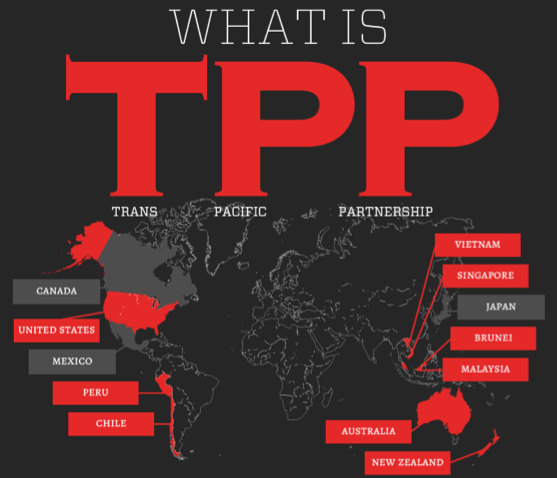
Graphic by Electronic Frontier Foundation (CC BY)
Hae-in Lim, Lisa Ferguson, Ellery Roberts Biddle, and Sarah Myers contributed to this report.
Global Voices Advocacy's Netizen Report offers an international snapshot of challenges, victories, and emerging trends in Internet rights around the world. This week's report begins in the Internet, where Wikileaks released a secretly negotiated draft text of the Trans-Pacific Partnership (TPP) trade agreement chapter on intellectual property rights last week. Since the beginning of the TPP negotiations, drafts of the agreement have been unavailable to the general public. The longest section of the chapter, called “Enforcement,” describes policing measures that would chip away at individual rights and online privacy, and create new liabilities for Internet service providers. The TPP Chief Negotiators summit is being held from November 19–24, in Salt Lake City, US. Watch this cartoon, created by the Electronic Frontier Foundation, to learn more about TPP.
Free Expression: ProPublica Rescues Censored Content from Sina Weibo
Last week, ProPublica released five months’ worth of research on censorship on Sina Weibo, China’s most popular social media platform. The crown jewel of the study is a gallery of censored images and text organized by categories including “censorship”, “scandals & corruption”, “political speech”, and “Bo Xilai” (disgraced politician).
New research from Citizen Lab demonstrates how the Japanese instant messaging app LINE censors users in China. When users set their country to China, the app downloads a list of censored keywords — such as Tiananmen Square and terms related to Falun Gong — and blocks messages that contain them.
Canadian adultery site Ashley Madison beckons users, “Life is short. Have an affair.” But Singapore’s Media Development Authority doesn't agree. The agency has instructed Internet service providers to block the website because its “flagrant disregard” for “family values” violates Singapore’s Internet Code of Practice.
Mediaites in Bulgaria say that informal, small-scale news blogs are becoming increasingly popular in the wake of new regulations on media organizations.
Malaysia’s Federal Department of Islamic Development is calling for new online content restrictions, in an effort to curb online “attacks against Islam.”
A University of Pennsylvania study offers comprehensive data on URL and keyword blocking on Wikipedia’s Persian site within Iran.
Thuggery: Press freedom award (but no freedom) for Dieu Cay
Vietnamese blogger Nguyen Van Hai, who writes as Dieu Cay, is facing twelve years in prison for allegedly “conducting propaganda” against the state. Hai will be awarded with the Committee to Protect Journalists’ 2013 International Press Freedom Award later this month, and will be the only recipient not to attend the ceremony.
Privacy: Surfing in Ecuador? Smile for the camera
Proposed revisions to Ecuador’s Criminal Code will require all Internet service providers to maintain records of users’ Internet activity for at least six months, and will also require cyber cafes to install surveillance cameras to record customers. The revisions could violate the country’s Constitution and impose economic costs on cybercafe owners, which could diminish Ecuador’s already low Internet penetration rate.
Germany and Brazil introduced a draft resolution titled “The Right to Privacy in the Digital Age” before the UN General Assembly. A coalition of digital rights groups are supporting the resolution, provided that it maintains its current emphasis on individual privacy as a fundamental human right and broad protections for communications data.
Private election data from Mexican citizens has been made available on the website buscardatos.com, apparently drawn from the database of the Mexican Federal Electoral Institute (IFE). According to the Mexican newspaper Reforma, the data includes voters’ passwords and home addresses, matched to their last names. The IFE has filed a formal complaint with the Attorney General’s office, and the Mexican Federal Public Administration.
Copyright: Google Books is all right
A New York District Court ruled in favor of Google in a controversial lawsuit over Google Books. The judge found that Google’s transformative use of copyrighted books fell under fair use guidelines, noting that the project offers innovative tools for research and expands access to books for all Internet users, including the print disabled. Indeed, Google Books provides its services in a format that is compatible with text enlargement software, text-to-speech screen access software, and Braille devices.
Netizen Activism
A trailer for the documentary “The Internet’s Own Boy” has launched. The film chronicles the life of Internet activist Aaron Swartz and the tragic circumstances surrounding his untimely death.
Cool Things: finalcountdown.com for sale!
Yahoo will be holding a week-long auction to sell off a set of old domain names it no longer wants. Among the names available are finalcountdown.com and sandwich.com. Prices for the domains range from $1,000 to $1.5 million—hope you’ve been saving, Rocky fans.
Publications and Studies
-
Citation Filtered: Iran’s Censorship of Wikipedia — Nima Nazeri & Collin Anderson
-
Asia Chats: Analyzing Information Controls and Privacy in Asian Messaging Applications – Citizen Lab
-
Digital Footprints and Identities: Community Attitudinal Research Report —Australian Communications and Media Authority
-
Measuring Internet Activity: A (Selective) Review of Methods and Metrics —Berkman Center for Internet and Society
Subscribe to the Netizen Report by email




1 comment